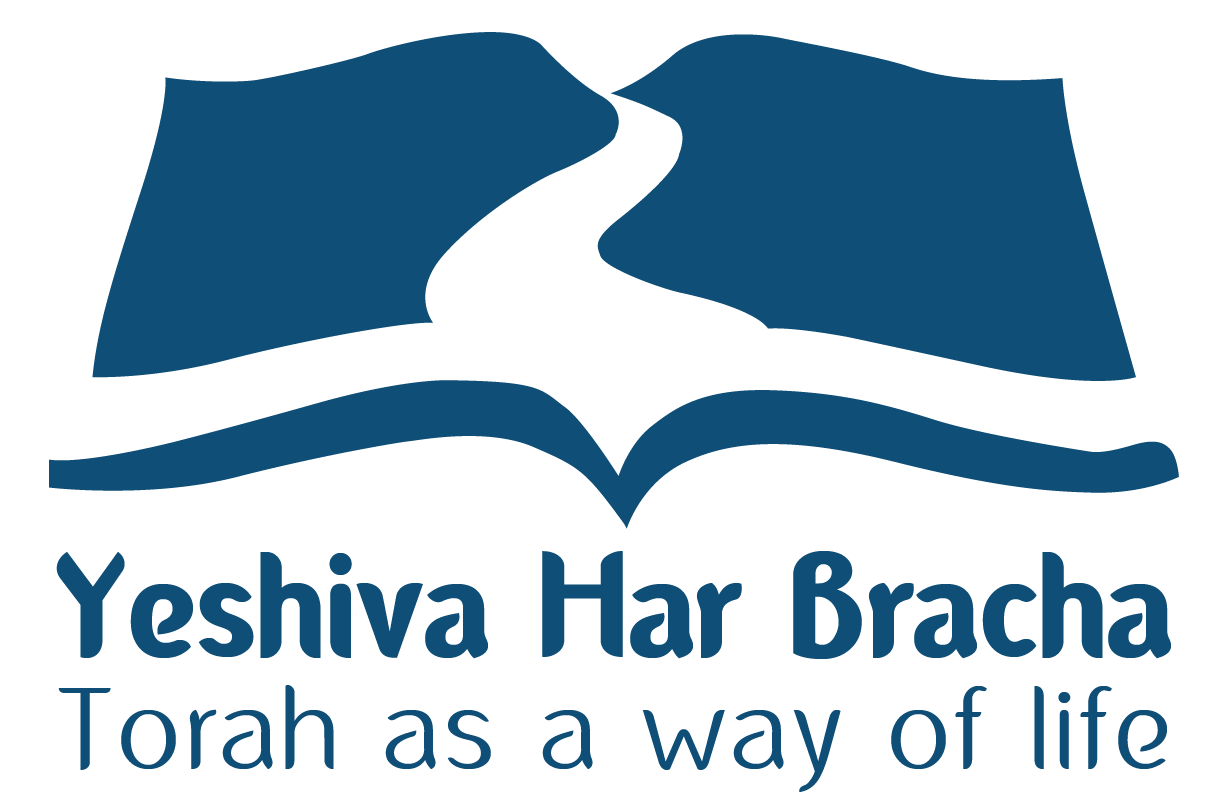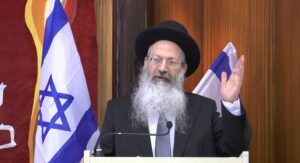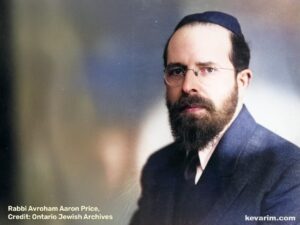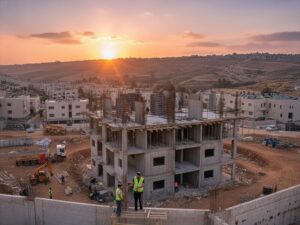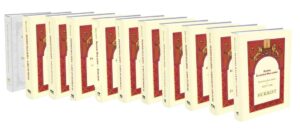“I do not know of a better compendium of Jewish Law than “Peninei Halakha” by Harav Eliezer Melamed shlita. The clarity and organization of the legal requirements of Judaism makes the study of Jewish Law most pleasurable for any interested student. I recommend it with all my heart.”
HaRav Shlomo Riskin
Chief Rabbi of Efrat and Founder of the Ohr Torah Stone network
“ ‘And the gold of that land is especially good’ this comes to teach that there is no Torah like the Torah of the Land of Israel, and no wisdom like the wisdom of the Land of Israel.”
“Peninei Halakha” is a unique and comprehensive series of books on Jewish Law (Halakha) by Rabbi Eliezer Melamed, Rosh Yeshiva and Rabbi of the Har Bracha community. The series transmits the Halakhic tradition of generations with a vitality that is uniquely rooted in the Land of Israel, fulfilling the notion of ‘aged and choice wine in a new and beautiful vessel.’ Appropriate for this era of the ‘Ingathering of the Exiles’ and the dawn of the Redemption, the books are written in a clear and modern language, clarifying the halakhot with their spiritual meanings, and relating to the customs of the various ethnic groups. The halakhot are explained starting from the general rules down to the minor details, with an emphasis on relevant issues which have arisen in the modern era. Thus, the books help to strengthen the observance of halakha amongst the Jewish nation to serve as a bridge between the Heavenly morals and everyday life, and to add love for the Torah amongst those who study halakha.
Until now, 22 books have been published in the series. Over 1,000,000 books from the series “ Peninei Halakha ” are studied in thousands of homes and educational institutions in Israel.
The series is currently being translated into English, French, Russian and Spanish.
So far, 10 books have been translated into English: Tefilah, Pesach, Zemanim, Shabbat A and B and more. They can be viewed, free of charge, here.
Tefilah – the foundations of the laws of prayer, the preparations before prayer, the three prayers themselves, the Amidah, the Shema prayer before sleep, the appropriate place for prayer and the minyan, the differing versions of prayer, and more.
Tefilat Nashim – the laws of prayer with an emphasis on the uniqueness of women’s prayer in Halakha and its reasons. In addition, some of the laws of prayer and Kiddush for Shabbat and holidays were added to the book, with emphasis on the laws relating to women, and a general chapter on differing versions of prayer and customs.
Berachot – includes the laws of blessings over food and washing of the hands, the blessings of fragrances, the blessings on unusual sights, blessings over happy occasions, the blessing ‘hagomel’, and the laws of ‘derech eretz’.
Shabbat A and B – includes preparations for Shabbat, the times of Shabbat, the lighting of the Shabbat candles, the laws of Kiddush, Havdalah, the meals, the Tefilot and Torah study on Shabbat. The books then deal with forbidden acts on shabbat: cooking, kindling and extinguishing fire, electricity, washing clothes, carrying from one domain to another, ‘borer’, ‘eruvin’, ‘muktze’ the laws of sickness and healing on Shabbat, Pikuach Nefesh and army duties, and many more subjects..
Pesach – the meaning of the holiday, the rules of the prohibition of hametz, the checking for and destroying of hametz, annulment, elimination, and destruction of hametz, mixtures of hametz, topics dealing with kashrut of different foods on Pesach, legumes (“kitniyot”), preparing utensils and the kitchen, the laws and customs of Erev Pesach, the laws of matzah, and the laws of the ‘Seder’ night.
Z’manim – the laws of Rosh Chodesh, the counting of the Omer, Memorial Day, Independence Day, Yom Yerushalayim, Lag B’Omer, Channukah, the month of Adar and Purim, the Three Weeks and the Fasts over the Destruction of the Temple – the 10th of Tevet, the 17th of Tamuz, Tisha b’Av, and the Fast of Gedaliah.
Moadim – the laws of Yom-Tov, Chol Hamoed, second-day Yom-Tov, Eiruv-Tavshilin and Shavuot.
Sukkot – the laws of building and residing in a Sukkah, Arba’at Haminim – The Four Species, Shmini-Atzeret/Simchat Torah, ‘Hosh’ana Rabba’ and ‘Hak’hel’
The Nation and the Land – a compilation of laws and faith-based explanations concerning national topics such as the mitzvah to settle the Land, Jewish labor, remembering the Temple, the laws of the army and wars, and the laws of converts. The book includes halakhic responses from Rabbi Goren and other rabbi’s on these issues.
Likutim A – the book deals with the laws of Talmud Torah, educating towards Torah, the Sefer Torah, repository for old religious items (‘geniza’), synagogue, kippa (yarmulke), tzitzit, tefilin, mezuzah, Kohanim, tithes, etc.
Likutim B – the book deals with the laws between man and his fellow man, such as: telling the truth, deceit, stealing, loans, charity, hospitality, the laws of a murderer and one who commits suicide, guarding one’s life, road safety, abortion, autopsies, transplants, etc.
Family – this book deals with laws concerning family life, such as: brit milah, pidyon ha’ben, marriage, modesty, physical relations, and honoring parents.
Days of Awe – Deals with the Halakhot (Jewish Law) of the Days of Judgment, including Rosh Hashanah and Yom Kippur. Topics include the prayers (Tefilot) and Selichot (penitential prayers), the Ten Days of Repentance, the laws of fasting, and an explanation of the service of the Kohen Gadol (High Priest) in the Temple, among others.
Kashrut – Covers the laws concerning kosher animals and vegetation, including Halakhot related to Challah separation, Kilayim (forbidden mixtures) of the vineyard and seeds, the separation of Terumot and Ma’aserot (tithes), Shiluach HaKein (sending away the mother bird), Tza’ar Ba’alei Chaim (preventing cruelty to animals), and more.
Kosher Kitchen – Addresses the laws of Kashrut concerning food and the kitchen, including Halakhot of non-kosher animals, blood and the preparation of meat, forbidden creatures, meat and milk, non-Jewish foods, Kashering utensils and the kitchen, matters of danger, the food industry, and more.
Simḥat Ha-bayit U-virkhato – Focuses on the foundations of marriage and the essence of the spousal relationship. It details the value and sanctity of the Mitzvah of marital relations (Onah), the Mitzvah of procreation (P’ru U’rvu), challenges of fertility, and the termination of pregnancy.
Family Purity – Deals with the laws of Niddah (menstruation), the sighting of blood and stains, prohibitions during the restricted days, the Seven Clean Days, calculating cycles, preparations for immersion and interpositions (Chatzitza), laws of a bride, pregnant women, and women after childbirth, and the laws of Mikva’ot.
Shmita and Yovel – Deals with the Mitzvah of the Sabbatical Year (Shmita), including the command of resting the land, the waiver of fruit rights, Shmita produce, the time, place, and people involved, Shmitat Kesafim (waiver of debts), the Heter Mechira (selling of land), Otzar Beit Din (Rabbinic storehouses), buying produce during Shmita, the Mitzvah of the Jubilee Year (Yovel), and the vision of the Sabbatical Year.
Conversion – Covers the topic of conversion (Giyur), the status of the righteous convert (Ger Tzedek), complex conversions, the Beit Din (Rabbinic court), practical conversion procedures, conversion in exigent circumstances (B’Sha’at HaDchak), conversion of minors, family law, the status of the convert, and their Halakhot.
Faith and its Mitzvot A – Deals with Jewish faith, faith versus idolatry (Avodah Zarah), the prohibitions of Avodah Zarah, self-sacrifice (Mesirut Nefesh), Avodah Zarah for Noahides (Bnei Noach), Christianity, Islam, Eastern religions, and more.
Faith and its Mitzvot B – Deals with Prophecy, the Divine Spirit (Ruach HaKodesh), nature versus miracles, sorcery, practical Kabbalah, Rabbis and miracle workers, curses and blessings, fortune-telling, astrology, faith in our generation, and more.
Further books are planned to be published in the near future, G-d willing.
The books in the series “Peninei Halakha” have merited the approval of the Gedolei Ha’dor, including Rabbi Avraham Elkana Kahana Shapira זצ”ל , Rabbi Shlomo Goren זצ”ל , Rabbi Shaul Yisraeliז צ”ל , Rabbi Mordechai Eliyahu זצ”ל, Rabbi Eliyahu Bakshi Doron, Rabbi Meir Mazuz, Rabbi Dov Lior, and Rabbi Nachum Eliezer Rabinowitz.
“Peninei Halakha” Educational Programs has received wide-acceptance amongst students in numerous institutions. In yeshivot, pre-military academies, and in girl’s seminaries the books are learned joyfully and studiously. Additionally, the books have made their mark in high schools, yeshiva-high schools and ulpanot, enabling students to strengthen and grow in the study of halakha. Students eagerly await the publication of more books in the series. The books have been incorporated in various educational programs, and the Ministry of Education has approved matriculation exams based on the series.
